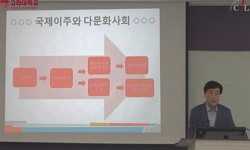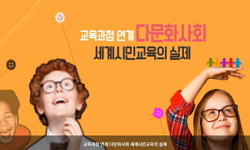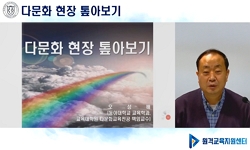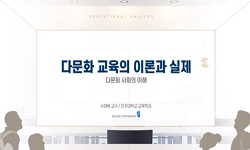To investigate whether religion as social institution in South Korea is a factor contributing to social cleavages rather than social integration, we examine the effect of religious affiliation and belief on individuals' social identity, ideological pr...
http://chineseinput.net/에서 pinyin(병음)방식으로 중국어를 변환할 수 있습니다.
변환된 중국어를 복사하여 사용하시면 됩니다.
- 中文 을 입력하시려면 zhongwen을 입력하시고 space를누르시면됩니다.
- 北京 을 입력하시려면 beijing을 입력하시고 space를 누르시면 됩니다.

사회균열의 축으로서의 종교: 종교 간 가치 및 태도의 차이를 중심으로 = Religion as An Axis of Social Cleavage: Focusing on Inter-Religious Differences in Value System and Attitude
한글로보기https://www.riss.kr/link?id=A104522287
- 저자
- 발행기관
- 학술지명
- 권호사항
-
발행연도
2013
-
작성언어
Korean
- 주제어
-
등재정보
KCI등재
-
자료형태
학술저널
-
수록면
221-252(32쪽)
-
KCI 피인용횟수
10
- 제공처
- 소장기관
-
0
상세조회 -
0
다운로드
부가정보
다국어 초록 (Multilingual Abstract)
To investigate whether religion as social institution in South Korea is a factor contributing to social cleavages rather than social integration, we examine the effect of religious affiliation and belief on individuals' social identity, ideological preference as well as attitude toward other religions and politics. While previous research around this topic has been focused on theoretical discussion, this paper empirically analyze the differences among various religious groups in behavior and attitude in relation to socially controversial issues, using the 2008 Korean General Social Survey (KGSS). The analyses was performed in following four areas: (1) individual happiness and socio-economic status; (2) value systems on socially controversial issues; (3) relationship between religion and politics; (4) attitude toward other religions and religious extremism. In addition, we analyze the extent to which religiosity and religious affiliation affect social cleavage, in comparison to other contributing factors incurring social cleavage, such as generation, ideology, region, and occupation(class). The findings are as follows: depending on religious affiliation, there are statistically significant differences in four areas (consisting of twelve subcategories), except for two subcategories (i.e. income and attitude toward coexistence of multi-religions. Some notable findings are as follows. There are significant difference among religious groups in sexual attitude and opinions with regards to abortion. As is in the case of Western societies, there is substantial differences in these issues between religious and non-religious groups in South Korea. Interestingly, there also exists significant difference in these issues, depending on their religious affiliations. Compared with Catholics and non-religious groups, Protestants and Buddhists tend to agree with political involvement of religious leaders. Regardless of their religious affiliations, respondents seem to accept coexistence of multi-religions in South Korea. However, according to analysis on inter-religious favorableness and social distance, Protestants are least favorably regarded by other religious group members and non-believers, and show highest level of exclusivity to others. We discuss the implications of these findings as well as limitations and future research suggestions.
국문 초록 (Abstract)
본 연구는 종교가 한국사회에서 사회통합보다는 사회균열의 요인으로 작용하는지를 검증하기 위해 종교 참여와 신념이 개인의 종교적․사회적 정체성과 개인적 가치와 태도에 미치는 영향...
본 연구는 종교가 한국사회에서 사회통합보다는 사회균열의 요인으로 작용하는지를 검증하기 위해 종교 참여와 신념이 개인의 종교적․사회적 정체성과 개인적 가치와 태도에 미치는 영향을 살펴보았다. 기존의 연구와 논의들이 주로 담론 및 이론적인 수준에서 진행되어왔던 것에 반해 이 글은 “2008 한국종합사회조사”를 활용하여 한국사회의 주요 쟁점가치에 대한 종교간 의식 및 태도의 차이를 경험적으로 비교․분석하였다. 분석은 크게 ‘개인적 성공’, ‘일상생활과 관련된 사회적 가치’, ‘종교와 정치의 관계에 대한 의식’ 그리고 ‘타종교에 대한 의식 및 태도’의 네 가지 영역을 중심으로 실시하였다. 또한 다른 사회균열의 축으로 고려되는 세대, 이념, 지역 그리고 직업(계급)과의 비교를 통하여 종교가 사회균열에 어느 정도의 영향을 주는지 분석하였다. 분석결과 4개의 분석영역의 하위 12개의 구성요소 중 2개의 구성요소(소득과 타종교와의 공존)를 제외한 나머지 모든 구성요소들은 종교별로 유의미한 차이가 있었다. 주목할 만한 결과들은 다음과 같다. 성적 자유의식과 낙태에 관한 의식은 종교별로 유의미한 차이를 보이고 있다. 이는 서구사회에서와 마찬가지로 한국사회에서도 성적 자유의식과 낙태에 대하여 종교인과 비종교인 그리고 종교간 인식 차이가 있음을 의미한다. 이와 같은 사회적 가치에 대한 인식 차이는 서구사회에서도 나타나는 것이지만, 한국사회에서는 특히 종교간에도 유의미한 차이를 확인할 수 있었다. 정치적 태도를 살펴보면 불교도와 개신교도들은 무종교인들에 비하여 종교지도자들의 정치관여에 높은 동의율을 보이고 있다. 종교집단별로 타종교와의 공존에 대한 의식 및 태도에는 유의미한 차이는 없었고 이는 다종교사회인 한국사회에서 공존적 가치를 가진 것을 보여주고 있다. 그러나 종교집단 간 호감도 및 사회적 거리 분석결과 개신교집단에 대한 사회적인 분위기가 호의적이지 않고, 개신교가 타종교인과 무종교인보다 종교적 배타성 정도가 높았다. 본 연구의 분석결과는 종교가 개인의 성공과 일생생활 관련 사회적 가치뿐만 아니라 정치적 태도와 타종교에 대한 의식구조에 큰 영향을 주고 있으며, 한국사회에서 세대, 이념, 지역, 계급과 더불어 사회균열의 주요한 축으로 자리잡고 있음을 보여주고 있다.
참고문헌 (Reference)
1 강인철, "해방후한국의종교적시장상황의구조적특징" 22 : 308-335, 1994
2 김녕, "한국정치와 교회-국가 갈등" 소나무 1996
3 정한울, "한국정치에서종교균열현실화되나?" 36 : 1-10, 2008
4 윤인진, "한국적 다문화주의의 전개와 특성: 국가와 시민사회의 관계를 중심으로" 한국사회학회 42 (42): 72-103, 2008
5 김준호, "한국의다종교적상황에대한 연구" 3 : 321-352, 1996
6 김명수, "한국의 추격적 경제성장과 문화적 복잡성" 한국문화경제학회 13 (13): 307-342, 2010
7 박경하, "한국의 다문화 연구 현황과 과제" 중앙사학연구소 33 (33): 87-124, 2011
8 노치준, "한국의 교회조직" 민영사 1995
9 오경석, "한국에서의 다문화주의: 현실과 쟁점" 한울아카데미 2009
10 박병진, "한국사회의 종교와 사회균열" 한국사회학회 1 : 641-665, 2009
1 강인철, "해방후한국의종교적시장상황의구조적특징" 22 : 308-335, 1994
2 김녕, "한국정치와 교회-국가 갈등" 소나무 1996
3 정한울, "한국정치에서종교균열현실화되나?" 36 : 1-10, 2008
4 윤인진, "한국적 다문화주의의 전개와 특성: 국가와 시민사회의 관계를 중심으로" 한국사회학회 42 (42): 72-103, 2008
5 김준호, "한국의다종교적상황에대한 연구" 3 : 321-352, 1996
6 김명수, "한국의 추격적 경제성장과 문화적 복잡성" 한국문화경제학회 13 (13): 307-342, 2010
7 박경하, "한국의 다문화 연구 현황과 과제" 중앙사학연구소 33 (33): 87-124, 2011
8 노치준, "한국의 교회조직" 민영사 1995
9 오경석, "한국에서의 다문화주의: 현실과 쟁점" 한울아카데미 2009
10 박병진, "한국사회의 종교와 사회균열" 한국사회학회 1 : 641-665, 2009
11 조대엽, "한국사회의 전환과 사회통합의 패러다임" 7 (7): 5-39, 2006
12 최우영, "한국사회의 잠재된 종교전쟁" 한국사회학회 73-83, 2007
13 강인철, "한국사회와 종교권력: 비교역사적 접근" 역사문제연구소 77 : 118-149, 2006
14 강인철, "한국기독교회와 국가: 시민사회" 한국기독교역사연구소 1996
15 이원규, "한국교회의 사회학적 이해" 성서연구사 1992
16 류성민, "한국 종교인구 분포 비율의 변화와 그 특징 ―1985년, 1995년, 2005년의 인구센서스를 중심으로―" 한국종교학회 56 (56): 25-66, 2009
17 이진구, "한국 개신교와 선교 제국주의" 33 : 178-192, 2002
18 장경섭, "청소년기의 사회각축장화: 한국의 압축적 근대성과 청소년" 한국가족학회 18 (18): 93-125, 2006
19 정재식, "지구촌 사회의 종교적 진통" 12 : 88-106, 1996
20 서우석, "중산층 대형교회에 관한 사회학적 연구" 28 : 151-171, 1994
21 정한울, "종교와 정치: 한국의 종교, 정치분석의 변수인가?" 8 : 1-8, 2007
22 한내창, "종교와 성태도 간 관계" 한국사회학회 44 (44): 114-138, 2010
23 한내창, "종교성과 타종교와의 결혼 허용도" 한국사회학회 46 (46): 130-155, 2012
24 한내창, "종교성과 타종교에 대한 관용도" 한국사회학회 38 (38): 33-61, 2004
25 한내창, "종교성과 사회적 태도" 한국사회학회 431-444, 2012
26 배국원, "종교다원주의란 무엇인가" 10 : 16-37, 2002
27 김경재, "종교간의 갈등 현황과 그 해소방안에 대한 연구" 42 : 219-257, 2001
28 김만흠, "정치균열, 정당정치 그리고 지역주의" 28 : 215-237, 1998
29 이진구, "정교분리 담론과 정교유착의 현실" 7 : 158-176, 2001
30 조귀삼, "유럽과 한국의 다문화인 유입에 따른 종교 갈등의 비교와 선교 전략 연구" 한국복음주의선교신학회 17 (17): 175-210, 2012
31 오토마두로, "사회적갈등과종교" 한국신학연구소 1988
32 정기진, "사회균열구조 인식에 따른 유권자 정치성향과 정치선택 : 인과적 마케팅모델 탐색" 경희대학교 대학원 2008
33 이옥연, "미국 정교분리의 원칙과 정치현실: 사회적 보수주의를 중심으로" 국제지역연구센터 13 (13): 283-314, 2009
34 이신철, "미국 기독교 우파의 이념적 특징과 정치참여" 한국사회와철학연구회 (10) : 253-280, 2005
35 선우현, "다원주의는 사회적 진보의 징표인가? - 오늘의 다원주의적 한국 현실과 관련하여" 한국사회와철학연구회 (6) : 39-84, 2003
36 이종복, "다문화사회의 이해와 복지" 양서원
37 지종화, "다문화 사회와 한국무슬림의 적응과 대응" 1-22, 2010
38 한완상, "교회양적급성장에대한사회학적고찰, In 한국교회 성령운동현상과 구조" 대화출판사 1983
39 이수인, "개신교 보수분파의 정치적 행위-사회학적 고찰" 비판사회학회 (64) : 265-299, 2004
40 Robert N. Bellah, "Tokugawa Religion: The Values of pre-Industrial Japan" The free press 1960
41 Peter Berger, "The Sacred Canopy" Doubleday 1967
42 Kim, Andrew E., "Religious Influences on Personal and Societal Well-being" 62 (62): 149-170, 2003
43 Bryan R. Wilson, "Religion in Sociological Perspective" Oxford University Press 1982
44 유승무, "2008년 범불교도대회를 통해서 본 한국사회의 종교 간 갈등: ‘총성 없는 전쟁’" 동양사회사상학회 (19) : 85-108, 2009
동일학술지(권/호) 다른 논문
-
동아시아 가족의 다양성 : 한국과 대만의 가족제도와 규범 비교 연구
- 동양사회사상학회
- 왕혜숙
- 2013
- KCI등재
-
- 동양사회사상학회
- 박수호
- 2013
- KCI등재
-
‘모던modern’의 한국적 개념화에 대한 탐색적 연구: ‘근대近代’에 관한 『조선왕조실록』의 언어적 용례를 중심으로
- 동양사회사상학회
- 신종화
- 2013
- KCI등재
-
- 동양사회사상학회
- 국민호
- 2013
- KCI등재
분석정보
인용정보 인용지수 설명보기
학술지 이력
| 연월일 | 이력구분 | 이력상세 | 등재구분 |
|---|---|---|---|
| 2027 | 평가예정 | 재인증평가 신청대상 (재인증) | |
| 2021-01-01 | 평가 | 등재학술지 유지 (재인증) |  |
| 2018-01-01 | 평가 | 등재학술지 유지 (등재유지) |  |
| 2015-01-01 | 평가 | 등재학술지 유지 (등재유지) |  |
| 2013-09-24 | 학술지명변경 | 한글명 : 동양사회사상 -> 사회사상과 문화외국어명 : Jonrnal of East Asian Social Thoughts -> Jonrnal of Social Thoughts and Culture |  |
| 2011-01-01 | 평가 | 등재학술지 유지 (등재유지) |  |
| 2009-01-01 | 평가 | 등재학술지 유지 (등재유지) |  |
| 2007-01-01 | 평가 | 등재학술지 유지 (등재유지) |  |
| 2006-03-06 | 학술지명변경 | 외국어명 : Jonrnal of Asian Social Thoughts -> Jonrnal of East Asian Social Thoughts |  |
| 2004-01-01 | 평가 | 등재학술지 선정 (등재후보2차) |  |
| 2002-01-01 | 평가 | 등재후보학술지 선정 (신규평가) |  |
학술지 인용정보
| 기준연도 | WOS-KCI 통합IF(2년) | KCIF(2년) | KCIF(3년) |
|---|---|---|---|
| 2016 | 0.84 | 0.84 | 0.84 |
| KCIF(4년) | KCIF(5년) | 중심성지수(3년) | 즉시성지수 |
| 0.8 | 0.83 | 1.569 | 0.23 |




 스콜라
스콜라







